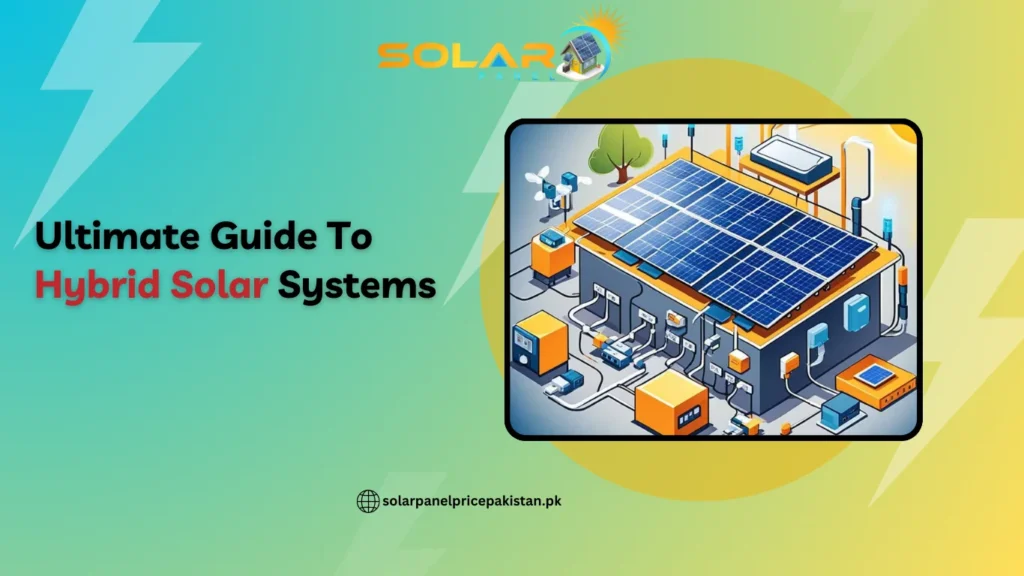The Ultimate Guide To Hybrid Solar Systems
With the advancement in renewable energy solutions, many businesses and house owners are preferring hybrid solar systems. These solar systems are way different from conventional systems. In this article, we will discover all the aspects that are necessary for understanding this advanced solar system.

What is A Hybrid Solar System?
In this type of solar system, a combination of traditional photovoltaic panels, additional energy sources, and storage solutions are used. This enhances the overall reliability and efficiency of the overall system. Unlike traditional solar systems that entirely depend on standalone solar batteries, hybrid systems rely on multiple energy sources.
These solar systems provide enhanced energy security while reducing the dependence on grid power. Installing this system can drastically decrease your electricity bills. These solar systems are perfect for areas where the energy cost is high and the grid power is unreliable.
What Does A Hybrid Solar System Include?
Typically, a hybrid solar system includes the below-mentioned components:
- Solar Panels: As we all know, solar panels are the essential and founding component of any solar system. The panels capture the light from the sun and then efficiently convert it into electricity. These panels are made of photovoltaic cells and are installed on your houses’ roofs. You can learn about the prices of these panels from solar panel prices in Pakistan.
- Inverters: Solar inverters are used to transform the direct current produced by the solar panel into an alternating current. The alternate current electricity is conventionally used by electric grids and appliances in our homes.
- Batteries as Storage System: When there is too much sunlight, the excess electricity that is generated is stored in these batteries. You can utilize this excess energy on cloudy days or at night. This reduces your dependability on the grid and ensures a continuous power supply.
- Grid Connection: Most of the hybrid solar systems are connected to the electric grids which lets individuals draw power when needed. It also lets the users feedback on excess energy to the grid. If the solar production is insufficient, the connection can be used to charge the battery system.
- Backup Generator: Some of the hybrid systems also include backup generators, these generators are optional. You can utilize these generators to gain additional power when there is low solar generation for a prolonged period. Users can also leverage these backup generators during the battery depletion.
How Does The System Work?
Hybrid solar systems operate with the integration of solar panels with backup generators and battery storage. During the day, the solar panels produce electricity using sunlight. Then this electricity is directly utilized by the houses or businesses. However, the excess electricity that is generated by the panels is directed to the battery storage.
When there is not enough electricity production by the panels on less sunny days, the system draws power from the batteries to be utilized by the home and business.
Benefits of Installing Hybrid Solar Systems
Having discussed the mechanism of the solar system, let us now explore the benefits of installing this type of solar system in your house and businesses.
- Enhanced Reliability: The hybrid solar system provides a consistent power supply with a combination of battery storage and solar energy. This makes the system reliable for users as it reduces the risk of power outages and offers continuous availability of energy.
- Independence of Energy: These systems decrease the reliance on external power sources and grids by storing excess solar energy. This makes the users energy independent especially in areas where the power supply is unreliable.
- Cost Efficiency: You can check the 3kw solar system price in Pakistan and analyze that hybrid solar systems are pretty cost-effective. These systems may have a higher investment in the initial state, but installing them can lead to long-term savings. Users can reduce their electricity bill by reducing their reliance on the grid by installing these hybrid solar systems.
- Energy Storage: Users can utilize the power of solar even when the sun is not shining by using the batteries as storage. This ability improves the security of the energy and allows the better management of energy consumption.
- Increased Scalability: Users can select the size of solar panels, backup generators, and capacity of the battery storage according to their specific energy needs. Thus hybrid systems can be a good choice if you are looking for a scalable power solution.
Conclusion
Hybrid solar systems showcase the important advancement in renewable energy technology by offering a combination of direct and stored energy. By creating a combination of solar panels, battery storage and backup generators, these solar systems provide an efficient and flexible solution catering to various energy needs. With the continuous evolution in technology, hybrid solar systems can become more efficient and reliable resources for electricity production and consumption.
Updated on: 24 February 2026
